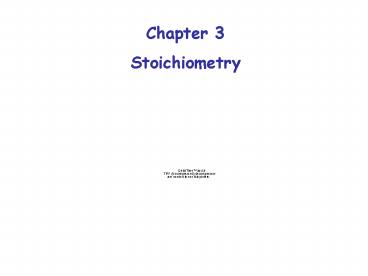Stoichiometry - PowerPoint PPT Presentation
1 / 26
Title:
Stoichiometry
Description:
You are a biologist studying the mating habits of the Asian Civet cat. ... The Sex Pheromone For The Asian Civet Cat. We are making bagel pizzas (pepperoni, of ... – PowerPoint PPT presentation
Number of Views:26
Avg rating:3.0/5.0
Title: Stoichiometry
1
Chapter 3 Stoichiometry
2
Law of Conservation of Mass
Lavoisier The total mass of all substances
present after a chemical reaction (the products)
is the same as the total mass of all substances
present before the reaction (the reactants)
1787 Irenee du Pont was apprenticed to
Lavoisier. Later founded the company as a
provider of gunpowder.
1794 Lavoisier is executed just months before
the execution of Robespierre, which ended the
Reign of Terror in France.
3
Stoichiometry
Stoichiometry includes all the quantitative
relationships involving atomic and formula
masses chemical formulas amount (moles) of
substances
4
Mass Percent
Table salt is what percent sodium by mass?
5
Determining Percent Composition From a Chemical
Formula
The formula mass (also called molecular mass,
formula weight or molecular weight) is the total
mass of all the elements that make up the compound
6
Aspartame
7
How many atoms are in 1 g of copper?
If Cu has an atomic mass of 63.546 amu, how does
this easily convert to grams?
Avagadros Number (the mole) relates atomic mass
to sample mass
NA 6.022 X 1023 1 mole
1 mole of atoms mass in grams equal to the
atomic mass
8
How many atoms are in 1 g of copper?
If Cu has an atomic mass of 63.546 amu, how does
this easily convert to grams?
Avagadros Number (the mole) relates atomic mass
to sample mass
NA 6.022 X 1023 1 mole
1 mole of atoms mass in grams equal to the
atomic mass
The molar mass, M, is the mass of one mole of a
substance.
9
How many atoms are in 1 g of copper?
10
An unknown compound is 26.1 carbon, 4.4
hydrogen and 69.5 oxygen by mass. What is the
empirical formula?
11
Finding an Empirical Formula From Mass Percent
- Choose an arbitrary sample size (100g is a good
choice) - Convert percent ? mass ? moles
- Write a formula with the molar values as
subscripts - Divide each subscript by the smallest subscript
value - Multiply all subscripts by a small whole number
to make the subscripts integral (if necessary)
12
An unknown compound is 26.1 carbon, 4.4
hydrogen and 69.5 oxygen by mass. What is the
empirical formula?
13
Representing Chemical Reactions
14
Balancing Chemical Reactions
- 1st Balance elements that occur in only one
compound on each side - Balance free elements last
- (Balance unchanged polyatomics as groups)
- Clear fractional coefficients by multiplication
- Never introduce extraneous atoms
- Never change chemical formulas
15
Equations and the Mole Concept
16
Reaction Types
Combination Reaction
Decomposition Reaction
Combustion Reaction
17
What mass of water is produced when 42.0 ml
ethanol is burned completely? (density of ethanol
0.790 g/ml)
18
You are a biologist studying the mating habits of
the Asian Civet cat.
You manage to isolate 62 mg of the Civet cat sex
pheromone
Combustion analysis of the pheromone
produces 138.0 mg CO2 and 49.4 mg H2O
19
Combustion Analysis
20
The Sex Pheromone For The Asian Civet Cat
21
Limiting Reagents
We are making bagel pizzas (pepperoni, of
course). For each pizza, we need 1 bagel, 1 oz.
tomato sauce, 2 slices of cheese and 5 slices of
pepperoni
22
Limiting Reagents
We are making bagel pizzas (pepperoni, of
course). For each pizza, we need 1 bagel, 1 oz.
tomato sauce, 2 slices of cheese and 5 slices of
pepperoni
23
Limiting Reagents
We are making bagel pizzas (pepperoni, of
course). For each pizza, we need 1 bagel, 1 oz.
tomato sauce, 2 slices of cheese and 5 slices of
pepperoni
If we have 13 bagels, 20 oz. of tomato sauce, 26
slices of cheese and 60 slices of pepperoni, how
many pizzas can we make?
24
If we react 85.0 g of Zn metal with 35.2 g of
HCl, what is the mass of H2 gas that is produced?
25
Actual Theoretical Yield
Theoretical Yield The maximum amount of product
that can be produced (usually reported in mol
or g) Actual Yield Real (measured) amount of
product that was produced/obtained (usually
reported in mol or g) Percent Yield The ratio
of actual yield to theoretical yield (reported
as a percent, ALWAYS 100 or less)
Actual Yield
Percent Yield
X 100
Theoretical Yield
26
We reacted 12.8 g of Al metal with excess HBr and
obtained 77.9 g of AlBr3. What is our percent
yield?

